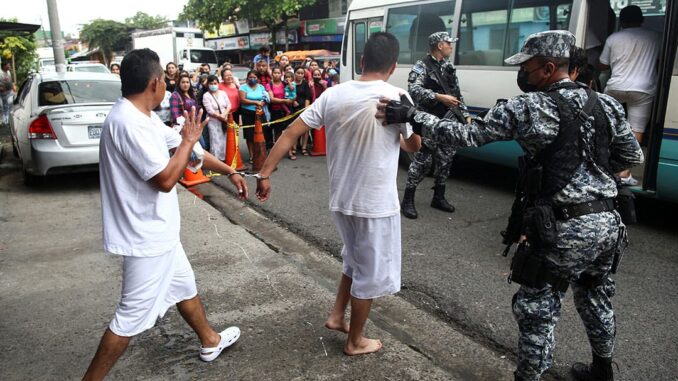
Four suspected Venezuelans aprehended in en masse in brutal El Salvador
Four suspected Venezuelans aprehended in en masse in brutal El…In recent developments, four Venezuelan nationals have been apprehended and transferred to El Salvador’s high-security prison, the Centro de Confinamiento del Terrorismo (CECOT), as part of a broader initiative targeting alleged gang members. This action aligns with the Trump administration’s intensified efforts to deport individuals identified as members of criminal organizations, particularly the Venezuelan gang Tren de Aragua, which has been designated a terrorist organization.
Background on the Deportations
The U.S. government, under President Donald Trump, has escalated measures to deport individuals deemed threats to national security. A notable aspect of this strategy is the utilization of the Alien Enemies Act of 1798, permitting the expedited removal of foreign nationals considered dangerous. This law has been invoked to facilitate the deportation of approximately 300 alleged members of the Tren de Aragua gang to El Salvador. The U.S. has agreed to compensate El Salvador with $6 million to incarcerate these individuals for one year, equating to $20,000 per detainee annually.
The Role of El Salvador
El Salvador, under President Nayib Bukele, has positioned itself as a pivotal ally in this initiative. The country has offered to accept deportees from the U.S., including those from nations other than El Salvador. This arrangement resembles a “safe third country” agreement, allowing the U.S. to deport non-Salvadoran migrants to El Salvador, thereby preventing them from seeking asylum in the U.S.
This agreement has facilitated the transfer of alleged gang members, including the four Venezuelans in question, to El Salvador’s CECOT facility.
Families’ Reactions and Concerns
The deportations have elicited profound distress among the families of the detainees. In Maracaibo’s Los Pescadores neighborhood, several Venezuelan mothers recognized their sons in images of the deported individuals sent to CECOT. These mothers assert that their children lack criminal records and have no affiliations with gangs. They identified their sons through distinctive tattoos or physical features in the circulated photographs. The sudden nature of the deportations, coupled with the absence of prior notification, has left these families devastated and seeking investigations to establish the innocence of their loved ones.
Legal and Ethical Implications
The deportations have sparked significant legal and ethical debates. Human rights organizations have criticized both the U.S. and El Salvador for allegedly using migrants as geopolitical tools and for the opacity surrounding the detainees’ legal statuses and prosecutions. Concerns have been raised about potential violations of due process, as many deportees have reportedly been incarcerated without formal charges or trials. The U.S. administration’s reliance on the Alien Enemies Act of 1798 for these deportations has also been contentious, with critics arguing that its application in this context is both legally and ethically questionable.
El Salvador’s Prison System and Financial Considerations
El Salvador’s acceptance of these deportees is not without financial incentives. The agreement stipulates that the U.S. will pay El Salvador $20,000 annually for each prisoner housed. This arrangement has been portrayed as mutually beneficial, providing the U.S. with a solution for detaining alleged gang members while offering El Salvador financial compensation. However, this deal has been met with criticism from human rights activists who argue that it may lead to human rights violations, including torture and denial of due process for the deportees.
Political Ramifications
The deportations have also had political repercussions. Secretary of State Marco Rubio has warned Venezuela of “severe and escalating” sanctions if it refuses to accept the repatriation of its citizens from the U.S. This ultimatum is part of the broader strategy to deport migrants without legal status and to terminate a temporary residency program for 350,000 Venezuelans. The Venezuelan government has condemned the deportations, referring to them as “kidnappings,” and has called for the return of its citizens. This diplomatic tension underscores the complexities inherent in international migration policies and the challenges of balancing national security concerns with human rights considerations.
Conclusion
The apprehension and deportation of the four Venezuelan nationals to El Salvador’s CECOT facility exemplify the current administration’s stringent immigration policies and its collaboration with foreign governments to address gang-related activities. While aimed at enhancing national security, these actions have raised significant legal, ethical, and humanitarian concerns. The plight of the affected families, the potential for human rights violations, and the diplomatic tensions with countries like Venezuela highlight the multifaceted challenges in implementing such policies. As the situation evolves, it remains imperative to scrutinize the legal frameworks and ethical considerations underpinning these deportations to ensure that the pursuit of security does not come at the expense of fundamental human rights.
Leave a Reply